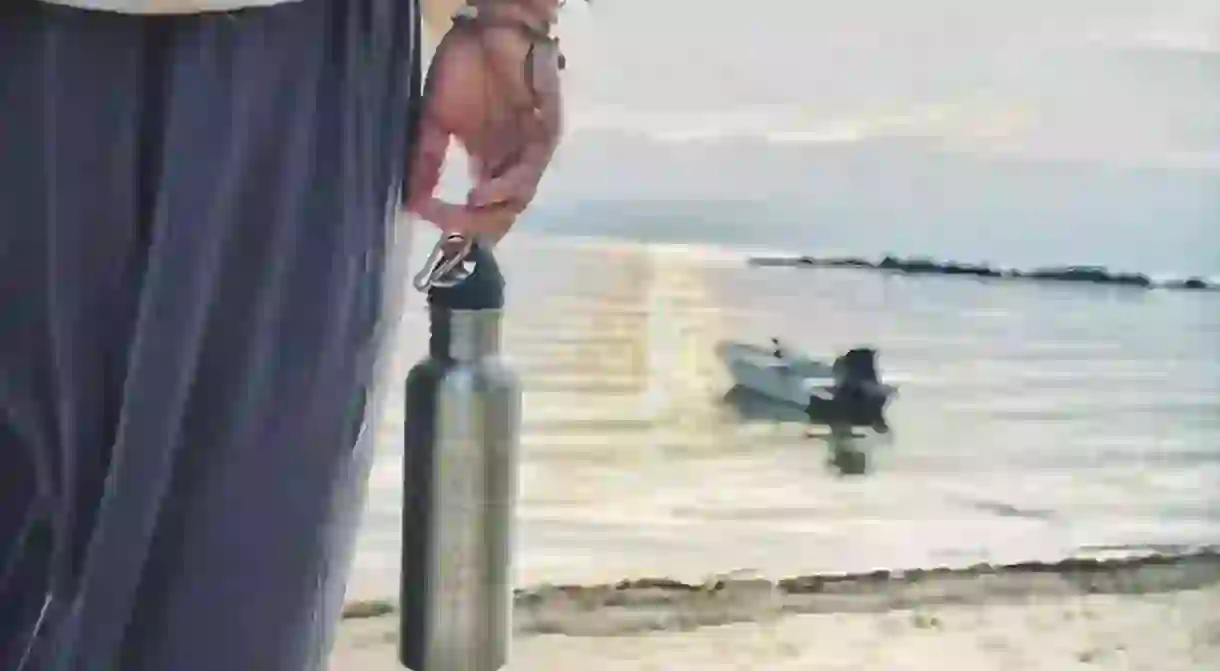9 Ways to Travel Sustainably in Thailand

Everyone’s familiar with the travel proverb “take only pictures, leave only footprints.” But sustainable travel today is about more than not leaving trash on beaches – it’s about making responsible decisions that positively impact the local community. Here are some easy ideas to travel sustainably when in Thailand.
Carry reusable items

Shopping and dining in Thailand is incredibly mainstream, but many areas still lack sustainable solutions to dealing with mounting plastic waste. Help remedy this problem by carrying a reusable water bottle to take advantage of water refill stations, and keep reusable bags on hand to reduce single-use plastic bags. Opt to dine in to avoid takeaway containers, or bring your own reusable coffee cup or bento boxes.
Limit plastic in your everyday routine

Try solid shampoos and conditioner, like these ones available at Lush Bangkok, to limit nasty spills in your luggage and reduce the amount of those small travel-size bottles going to waste. Bamboo toothbrushes and stainless steel razors tend to be much more durable and longer-lasting than their plastic counterparts, and are typically entirely degradable or recyclable.
Don’t suck

Thailand’s notorious “bucket culture” is certainly a highlight of many crazy nights out from the streets of Bangkok to the beaches of the South. But through the layers of body paint and blaring music, thousands of straws, empty buckets, and plastic cups wind up trashed on the side of the road or bobbing in the ocean. When ordering a drink, specify that you want no plastic straw, and return your buckets to the bar so that they can be reused. Or take your own stainless steel straws to restaurants.
Choose your activities responsibly

It wouldn’t be a complete trip to Thailand without a day spent among elephants, but do your research before heading to the first program you see. Riding elephants is enormously damaging to the animal, and the “training” process typically calls for removing baby elephants from their mothers and keeping them in enclosed spaces, where they endure beatings to become more submissive. As adults, the constant riding causes severe physiological problems and attributes to dramatically shortened life spans. Visit a responsibly run program like Elephant Nature Park, run in Northern Thailand, with a new branch opening on Koh Samui. This sanctuary cares for mistreated elephants rescued from the tourism and logging industries.
Use natural sunscreen

Before jumping in to explore Thailand’s pristine reefs, check your labels. Typical sunscreen brands contain a harmful chemical called oxybenzone, which is an endocrine inhibitor that can interfere in reef growth and development. Plus, it’s not too great for us humans, either. The problem got so bad for Hawaii’s reefs that the state government proposed legislation last year to ban the chemical from any products sold in the state. Go for natural sunscreens containing agents like zinc oxide, which will protect your skin without any harmful effects to you or the environment.
Don’t flush

Okay yes, flush that. But be aware that Thai plumbing has not quite reached the standard that many are used to in the West, and so cannot handle toilet paper and other sanitary items. What’s more, in many of the developing areas of Thailand, the sewage could be going directly into the ocean or jungle. Dispose of any tissue or other waste properly, or better yet go TP-free! The ‘bum gun’ is the way to go.
Contribute to Wildlife Monitoring Programs

Got some awesome GoPro footage of a turtle while snorkeling? Joined the lucky elite that have scuba dived with a whale shark? If you manage to get some good photos or video for mementos, leave your legacy with local conservation efforts. Several programs that study these endangered species include robust contributor-based datasets of images, recording an individual animal’s movements and behaviors over years. Turtles all have unique facial patterns, while whale sharks each have individual arrangements of spots so that researchers and conservationists can identify and monitor the local population. Check with local dive shops or travel agents to see if there is an active program in the area you visit.
Don’t change linens and towels daily

When staying at a hotel or guesthouse, opt to only have your sheets and towels changed every few days. More and more hotels are implementing policies to conserve their water and energy usage, asking guests to leave on the floor only what they want changed by housekeeping. Help the hotel keep its carbon footprint down by only asking for new towels and linens when necessary.
Join a cleanup

While picking up trash may not sound like the ideal holiday itinerary item, it’s a great way to meet local expats and Thais alike. In Bangkok, the nonprofit organization Trash Hero runs regular cleanups on Taco Lake, with free SUP boarding for participants. Trash Hero operates around the country as well, but communities and dive shops run their own cleanups too, often ending beach cleans at sunset with a free beer or barbecue for those involved. All in all, it’s a great way to meet new people and feel good about your time spent in a community.













